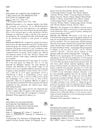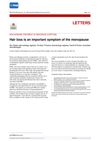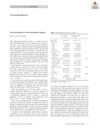 44 citations,
March 2004 in “Journal of Investigative Dermatology”
44 citations,
March 2004 in “Journal of Investigative Dermatology” The effects of estrogen on human hair growth are unclear and need more research.
 37 citations,
July 2010 in “International Journal of Trichology”
37 citations,
July 2010 in “International Journal of Trichology” Hair loss affects quality of life, self-esteem, and confidence, but younger patients cope better.
 June 2018 in “The Journal of Sexual Medicine”
June 2018 in “The Journal of Sexual Medicine” Finasteride does not negatively affect male reproductive function.
 September 2024 in “Journal of the American Academy of Dermatology”
September 2024 in “Journal of the American Academy of Dermatology” Early-onset male baldness may increase the risk of metabolic syndrome.
3 citations,
August 2019 in “Journal of Cancer Research and Therapeutics” Cetuximab can cause unusual hair growth and hair loss.
 13 citations,
December 2016 in “PubMed”
13 citations,
December 2016 in “PubMed” People with a common type of hair loss have higher stress levels in their body, and treatments that reduce this stress could help.
 23 citations,
December 2004 in “Differentiation”
23 citations,
December 2004 in “Differentiation” Sex hormones affect hair and feather growth and may help manage alopecia and hormone-dependent cancers.
 29 citations,
February 2004 in “Experimental and Clinical Endocrinology & Diabetes”
29 citations,
February 2004 in “Experimental and Clinical Endocrinology & Diabetes” Men with early balding often have hormone levels similar to women with polycystic ovary syndrome.
 5 citations,
November 2001 in “PubMed”
5 citations,
November 2001 in “PubMed” An 80-year-old woman's severe hair loss was caused by a hormone-secreting ovarian tumor.
8 citations,
June 2016 in “PubMed” Finasteride is effective and safe for treating hidradenitis suppurativa in both adults and some younger patients.
 3 citations,
January 2019 in “Cureus”
3 citations,
January 2019 in “Cureus” Hormonal imbalances in Polycystic Ovarian Syndrome (PCOS) might trigger a rare skin disorder called Confluent and Reticulated Papillomatosis (CRP), so dermatologists should consider checking for PCOS in CRP patients.
 10 citations,
November 2017 in “Dermatologic Clinics”
10 citations,
November 2017 in “Dermatologic Clinics” More men are getting cosmetic procedures, mainly for aging, hair loss, and to keep masculine features, with growing interest in both surgical and noninvasive treatments.
 January 2022 in “International Journal of Health Science”
January 2022 in “International Journal of Health Science” Topical products, especially specific shampoos, are effective in treating androgenetic alopecia by delivering active ingredients to hair follicles and improving hair quality.
 14 citations,
April 2022 in “Climacteric”
14 citations,
April 2022 in “Climacteric” Menopause causes dry skin, wrinkles, and hair changes, with hormone therapy helping but not recommended just for these issues.
 26 citations,
January 2019 in “Journal of The American Academy of Dermatology”
26 citations,
January 2019 in “Journal of The American Academy of Dermatology” Dermatologists are important in helping transgender people with skin issues and physical changes during their transition.
 10 citations,
December 2010 in “British Journal of Dermatology”
10 citations,
December 2010 in “British Journal of Dermatology” After menopause, some women lose scalp hair and gain facial hair, with patterns suggesting different underlying causes.
October 2022 in “Cosmoderma”  September 2017 in “Pediatric Dermatology”
September 2017 in “Pediatric Dermatology” A 14-year-old boy was diagnosed with a rare hair condition that may lead to hair thinning and has no known effective treatments.
 71 citations,
November 2013 in “Clinics in Dermatology”
71 citations,
November 2013 in “Clinics in Dermatology” Acne is a chronic disease linked to various systemic conditions and has significant psychological and social effects.
 98 citations,
February 2007 in “Seminars in Cell & Developmental Biology”
98 citations,
February 2007 in “Seminars in Cell & Developmental Biology” Androgens can both stimulate and cause hair loss, and understanding their effects is key to treating hair disorders.
 July 2015 in “Actas Dermo-Sifiliográficas”
July 2015 in “Actas Dermo-Sifiliográficas” A woman experienced excessive hair growth after using a hair loss treatment with minoxidil.
 September 2024 in “British journal of surgery”
September 2024 in “British journal of surgery” Autologous stem cell therapy may effectively increase hair density in Androgenetic Alopecia.
1 citations,
July 2022 in “JEADV Clinical Practice” New and existing treatments for hair loss show promise, with some being more effective for men and others for women.
 1 citations,
January 2018 in “BMJ”
1 citations,
January 2018 in “BMJ” Many women experience significant hair loss during menopause, and topical minoxidil is an effective treatment.
 2 citations,
August 2020 in “International Journal of Cosmetic Science”
2 citations,
August 2020 in “International Journal of Cosmetic Science” Lindera strychnifolia root extract may help balance scalp bacteria and potentially reduce hair loss.
 1 citations,
March 2020 in “International journal of reproduction, contraception, obstetrics and gynecology”
1 citations,
March 2020 in “International journal of reproduction, contraception, obstetrics and gynecology” The study concluded that the most common skin problems in women with PCOS are excess hair, acne, oily skin, hair loss, dark skin patches, and skin tags.
2 citations,
January 2019 in “Journal of Cosmetics, Dermatological Sciences and Applications” The supplement and lotion significantly reduced hair loss and improved hair health.
 2 citations,
November 2018 in “Clinical and Experimental Dermatology”
2 citations,
November 2018 in “Clinical and Experimental Dermatology” Acne is more common in men with male pattern baldness due to increased hormone levels.
 July 2023 in “International journal of dermatology, venereology and leprosy sciences”
July 2023 in “International journal of dermatology, venereology and leprosy sciences” Micro needling is a skin treatment that helps with various skin conditions including stretch marks, by boosting collagen production, but it may cause redness and irritation.
January 2025 in “International Journal of Pharmaceutics” A new gel improves hair loss treatment by effectively delivering minoxidil and finasteride to the scalp.
























